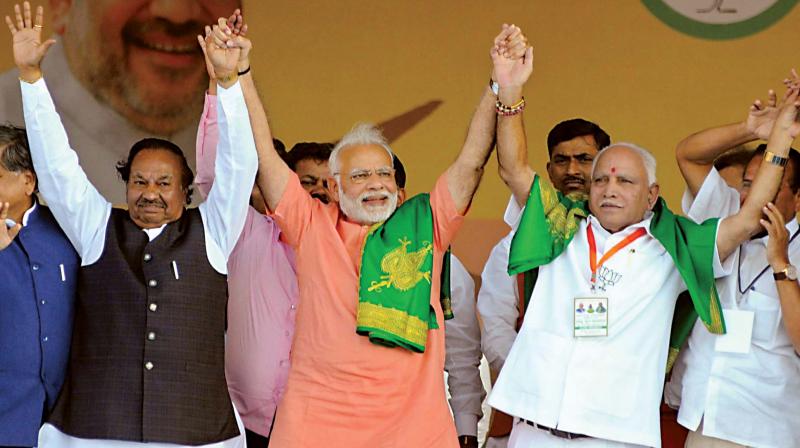PM Modi still popular but Siddu catching up fast
Three weeks on, there appears to have been a small but significant change in voter sentiment.

The final round of the Lokniti-CSDS pre-poll survey in Karnataka promises an increasingly interesting electoral scenario. In the middle of April when Jain University-Lokniti-CSDS had conducted the first round of the survey, the incumbent Congress and its main opponent the Bharatiya Janata Party (BJP) were found to be running almost neck-and-neck. The vote difference between the ruling party and its challenger was just two percentage points and it had seemed that the State was heading for a badly fractured electoral verdict.
Three weeks on, there appears to have been a small but significant change in voter sentiment. The Congress has inched ahead of the BJP and now leads it by about five percentage points in terms of the electorate's vote choice, 38% to 33%. While this is a gain of only 1 percentage point for the Congress, the BJP seems to have suffered a loss of 2 percentage points. Not only the Congress, the Janata Dal Secular (JD-S), the third key political player in the State, has also gained at the cost of the BJP, particularly in its stronghold areas in the southern part of the State. Preference for it among voters has gone up by two percentage points in the last few weeks, from 20% to 22%.
Anti-incumbency sentiment badly divided
The strengthening of the JDS has meant that the anti-incumbency sentiment against the Siddaramaiah government has got further divided thus making matters much easier for the Congress in a three-cornered contest. Currently, the survey finds that 47% of the voters do not want the Congress government to come back to power. Of them 53% are planning to vote for the BJP and 34% (mostly Vokkaligas) are leaning towards the JDS. In the previous round this split of the anti-incumbency vote had been 53% and 32% respectively. Although this division of anti-Congress votes is not as severe in coastal, central and northern Karnataka, it still has the potential of hurting the BJP's prospects, particularly in closely contested seats.
A localised election
The Congress's strategy of re-nominating close to 90% of its sitting MLAs may also be working in its favour in what appears to be a highly localised election. The survey did not find any major anti-incumbency against most MLAs, be they from any political party. Overall about 69% of the respondents in seats where the Congress had won last time were found to be satisfied with their MLA's performance.
The same figure for sitting BJP MLAs was at 79% and for JDS MLAs at 79%. This absence of resentment with representatives at the local level is significant since the survey also found that a sizeable number of voters are planning to vote for 'candidates' rather than 'party' come Voting Day. About 46% said they would cast their votes keeping in mind the candidate, 39% said that party would be their main consideration and for 12% the chief ministerial candidate of a party would matter to them most. While the BJP campaign has sought to make it a Rahul Gandhi versus Narendra Modi contest, and the Congress has made it about Siddaramaiah versus BJP, it should be noted that neither party nor CM candidate seem to be weighing heavily on the voter's mind for making the final choice. At this point in the race, the candidate consideration could trump both.
Popularity: Siddaramaiah not far behind Modi
Even though leadership/CM preference may not be a big voting consideration for most voters, among the few for whom it is, the Congress seems to be doing extremely well by netting over 42% of their votes. This is four points higher than the overall support that the ruling party seems to be getting at the moment. What's more, even though the electoral contest in the State seems localized, Chief Minister Siddaramaiah's popularity could be giving Congress candidates an added advantage against their opponents.
About one third spontaneously took Siddaramaiah's name as their chief ministerial preference. In the previous survey done in mid-April, this figure had been three percentage points less. BJP's B S Yeddyurappa still trails Siddaramaiah by some distance, even though his popularity has seen a marginal increase. Moreover, when voters were asked which of the two state leaders they liked more, Siddaramaiah trumped Yeddyurappa quite comfortably, 41% to 29%.
Siddaramaiah's popularity also threatens to overtake PM Modi's. Currently the latter leads the former by 4%, but given the immense popularity the Prime Minister enjoys, the fact that a state leader has come so close should be worrying for the BJP. Voters also rated the performance of Siddaramaiah's government more positively than they rated the Modi government's performance. About 72% said they were satisfied with the state government's work (29% fully so) during the last five years. In comparison, satisfaction with the Central government's performance was four points less at 68% (23% being fully satisfied).
No government in Karnataka has returned to power for over three decades. While the current trends still make it difficult to predict unambiguously, Congress inching ahead of its adversaries could be significant during this time of the race. The question to ask now is: could the Congress be on the verge of bucking Karnataka's trend and rewriting electoral history?
(The authors are associated with Lokniti, Centre for the Study of Developing Societies, Delhi)

